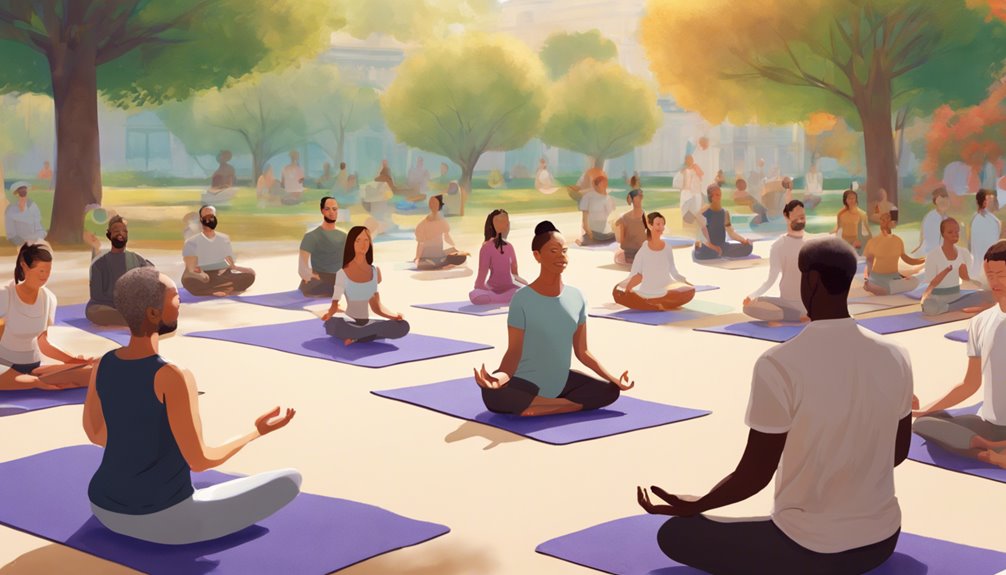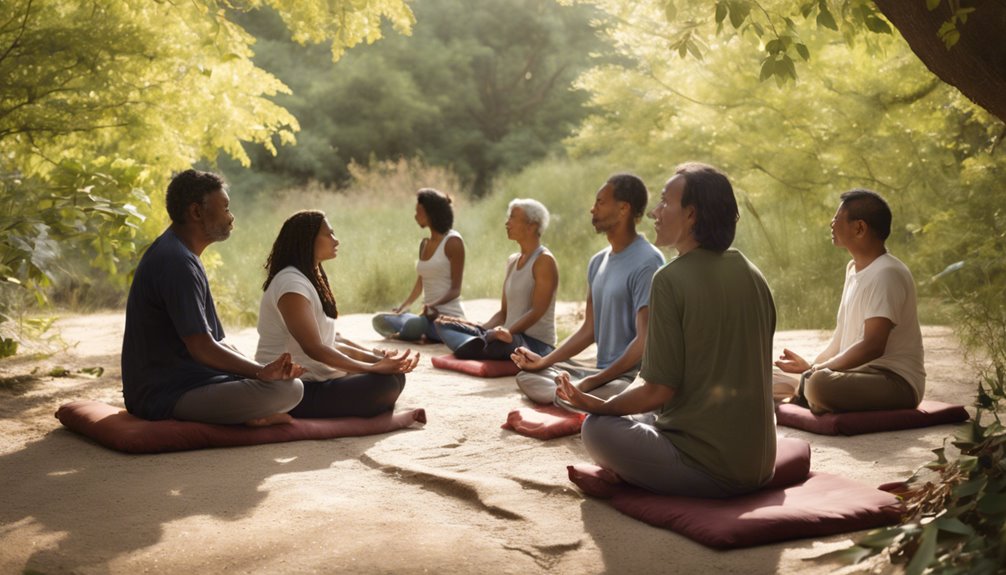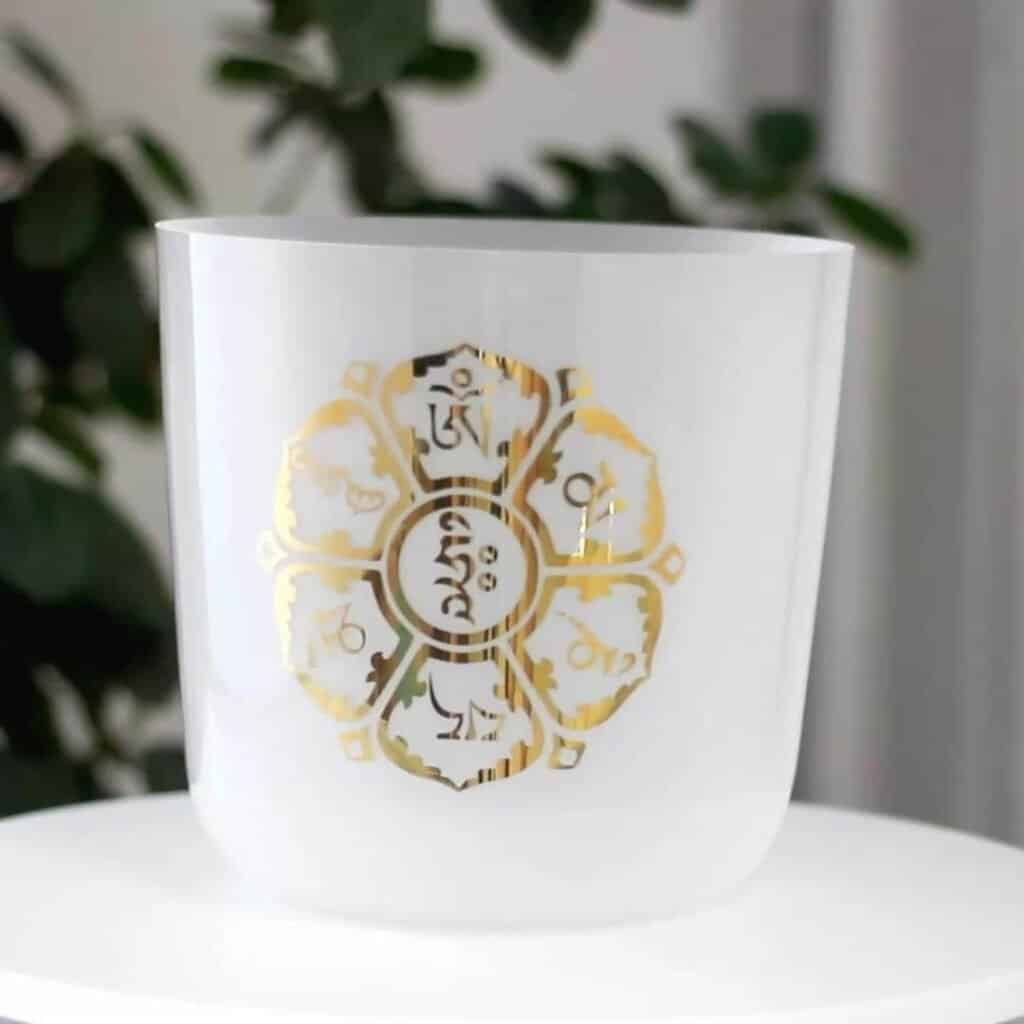Picture yourself sitting beneath a large, serene tree, each branch representing a different mindfulness technique waiting for you to explore. You might find that experimenting with these varied approaches not only enhances your practice but also fosters a deeper connection to your own thoughts and emotions. By engaging with different methods, you're likely to uncover unique benefits tailored to your needs, but how do you choose the right path amidst this potential richness? The answer lies in your willingness to discover and adapt.
Key Takeaways
- Exploring various techniques enhances your understanding of mindfulness through diverse cultural perspectives and innovative approaches.
- Different methods foster emotional connections and empathy, particularly through practices like loving-kindness meditation.
- Personalizing techniques allows for a unique meditation experience tailored to individual needs and preferences.
- Engaging in a variety of practices promotes emotional awareness, mental clarity, and resilience, improving overall well-being.
- Embracing open-mindedness encourages adaptability and growth, making mindfulness a dynamic and enriching journey.
The Benefits of Diversity

Diversity brings a wealth of benefits that can enhance any environment, whether at work or in personal life. You can gain a broader understanding of the world by embracing different cultural perspectives, which enrich your experiences and knowledge. With such an array of ideas and beliefs, you'll find yourself exposed to innovative approaches that challenge conventional thinking. This can lead to better problem-solving and creativity, making your work more dynamic and enriching.
In a diverse setting, collaboration thrives as team members bring unique viewpoints to the table, fostering an atmosphere where ideas can mingle and grow. You'll discover that discussions become more engaging, and solutions emerge more effortlessly when varied insights are considered. This diversity isn't just about surface-level differences; it's about tapping into the wealth of experiences each person brings. By encouraging others to share their perspectives, you'll facilitate a deeper understanding that not only strengthens teamwork but also promotes empathy and respect.
Personalizing Your Practice
Personalizing your mindfulness meditation practice allows you to tailor the experience to your unique needs and preferences. It's important to explore different personalized approaches that resonate with you, as this can enhance your overall experience. Consider what environment makes you feel most at ease—whether it's a quiet corner of your home, a serene park, or even a bustling coffee shop.
You might also find that specific techniques, such as guided meditations or mindful breathing, work better for you than others. By experimenting with these diverse styles, you create unique experiences that can greatly deepen your practice. Pay attention to how you feel during each session, noting what helps you focus, relax, or find clarity.
You can even adjust the duration of your sessions—some days, short bursts of meditation might suit your schedule, while on others, you might have the luxury of a longer reflective time. Remember, personalizing your practice isn't selfish; it's essential for truly benefiting from mindfulness meditation. Embrace this journey of self-discovery, as finding what clicks will not only make your practice enjoyable but also far more meaningful in fostering personal growth.
Understanding Different Techniques

When you explore mindfulness meditation, you'll find a variety of techniques that each offer unique benefits. Understanding these different approaches not only enhances your practice, but it also allows you to discover what resonates best with you. By embracing this variation, you can cultivate a richer, more effective meditation experience tailored to your personal preferences and lifestyle.
Types of Mindfulness Techniques
Exploring the various types of mindfulness techniques can open up new avenues for your practice. By experimenting with different approaches, you'll discover what resonates most with you. Two popular techniques are mindful breathing and the body scan. Mindful breathing emphasizes focusing on your breath, helping you cultivate awareness and center your thoughts. The body scan, on the other hand, involves mental scanning of your body from head to toe, promoting relaxation and body awareness.
Here's a brief overview of these techniques:
| Technique | Description |
|---|---|
| Mindful Breathing | Concentrating on your inhales and exhales, grounding you in the present. |
| Body Scan | A systematic awareness of sensations, tension, or discomfort throughout your body. |
| Walking Meditation | Combining mindfulness with movement, focusing on each step taken. |
| Loving-Kindness | Fostering compassion for yourself and others through specific phrases of goodwill. |
Each technique offers unique benefits, and you may find that alternating between them enhances your overall mindfulness experience. Give them a try, and see which ones help you feel more grounded and connected to your surroundings!
Benefits of Variation
Trying out different mindfulness techniques not only enriches your practice but also broadens your understanding of mindfulness itself. Embracing mindfulness variety can lead to exciting meditation exploration, and you'll discover new perspectives that enhance your overall experience. Think about the benefits you might experience as you diversify your practice:
- Enhanced Focus: Each technique can sharpen your ability to concentrate, allowing for deeper meditation sessions.
- Greater Emotional Insight: Different practices often bring forth various feelings, helping you understand and accept your emotions better.
- Increased Resilience: Engaging with various techniques can foster a stronger, more adaptable mindset, equipping you to handle stress with grace.
- New Skills and Techniques: Experimenting broadens your toolkit, giving you different methods to return to when you face challenges.
Enhancing Emotional Well-Being
Numerous studies highlight the powerful impact of mindfulness meditation on emotional well-being. When you engage in different mindfulness techniques, you cultivate emotional awareness and achieve greater mental clarity. This improved emotional state can lead to healthier relationships and a more satisfying life overall.
To help you understand the specific benefits of various mindfulness practices, here's a quick breakdown:
| Technique | Key Benefit | Emotional Impact |
|---|---|---|
| Body Scan | Heightened body awareness | Reduced emotional overwhelm |
| Loving-Kindness | Increased compassion | Greater self-acceptance |
| Breath Awareness | Enhanced focus | Improved emotional regulation |
| Guided Visualization | Positive imagery | Boosted motivation and joy |
Reducing Stress and Anxiety

Stress and anxiety can feel overwhelming, but mindfulness meditation offers effective techniques to help you regain control and find calm. By incorporating consistent mindfulness practices into your daily routine, you can experience significant anxiety relief and access numerous mindfulness benefits. Here are four techniques to help you reduce stress effectively:
- Breath Awareness: Focus on your breath. Inhale deeply, hold for a moment, and then exhale slowly. This technique grounds you in the present and alleviates overwhelming feelings.
- Body Scan: Lie down comfortably and mentally scan each part of your body. Notice any tension and consciously relax those areas, promoting physical and mental ease.
- Journaling: Write down your thoughts and feelings. Reflecting on what weighs you down can help you process and release pent-up anxiety.
- Nature Visualization: Picture a serene environment, like a quiet forest or a calm beach. Visualizing such peaceful spaces allows your mind to find rest and reclaim tranquility.
Sharpening Focus and Concentration
To enhance your focus and concentration, mindfulness meditation can serve as a powerful tool in clearing distractions and directing your mental energy. Engaging regularly in mindfulness practices allows you to develop effective focus techniques that help sharpen your attention. When you sit in meditation, you consciously train your mind to return to a single point, like your breath, whenever distractions arise. This practice not only improves your ability to focus but also lays the groundwork for your concentration exercises in daily life.
Exploring Mind-Body Connection

The mind-body connection plays an essential role in your overall well-being, intertwining mental and physical states in ways often overlooked. By cultivating mind-body harmony, you can enhance your conscious awareness and experience life more fully. It's fascinating to reflect on how your thoughts, emotions, and physical sensations interact. Here are four key aspects to explore:
- Breathwork: Focusing on your breath can ground you, calming your mind while energizing your body.
- Posture: Your body language communicates your feelings. Stand tall and confident to uplift your mood and influence your thoughts positively.
- Mindfulness Practices: Engaging in mindfulness meditation draws your attention to the present moment, fostering greater awareness of your mental and physical state.
- Movement: Activities like yoga or tai chi harmonize your body and mind, encouraging a flowing connection that promotes relaxation and focus.
Building Resilience Through Meditation
Meditation isn't just a way to relax; it can actually help you build resilience in your everyday life. By practicing emotional regulation techniques, you can better manage stress and enhance your focus, making it easier to face challenges head-on. As you integrate meditation into your routine, you'll find that these benefits support your mental strength and overall well-being.
Emotional Regulation Benefits
Building emotional resilience is like strengthening a muscle; it requires consistent practice and the right techniques. Mindfulness meditation can greatly boost your emotional regulation by enhancing emotional awareness and providing effective coping strategies. By engaging in these techniques regularly, you can improve how you manage intense feelings and navigate life's challenges.
Consider the following benefits of emotional regulation through mindfulness:
- Heightened Emotional Awareness: You'll become more attuned to your feelings, gaining insight into triggers and responses.
- Improved Coping Strategies: You'll learn healthier ways to deal with stress, anxiety, and anger, making it easier to handle difficult situations.
- Increased Patience: Mindfulness teaches you to pause before reacting, allowing for more thoughtful responses rather than impulsive reactions.
- Enhanced Empathy: As you regulate your emotions, you'll find it easier to relate to others and understand their feelings better.
These benefits collectively build your resilience, enabling you to face challenges with a steadier mindset. By regularly practicing mindfulness meditation, you're not just coping; you're thriving emotionally and developing a robust foundation for a fulfilling life.
Stress Reduction Techniques
Harnessing mindfulness techniques can play a significant role in reducing stress and enhancing your overall resilience. By consistently practicing methods like breath awareness, you can cultivate a calmer mind. When you focus on your breathing, you anchor yourself in the present moment, which helps quiet the mental chatter that often triggers stress. It's a powerful way to recharge your emotional batteries.
Additionally, the body scan technique further aids in stress reduction. This practice encourages you to mentally scan your body, paying attention to areas of tension or discomfort. As you bring awareness to these sensations, you learn to release them, which promotes relaxation and a sense of ease. By tuning into your body, you develop greater insight into how stress manifests physically, empowering you to address it more effectively.
Trying these techniques regularly can lead to a greater overall awareness of your internal landscape. Over time, you'll notice that not only does your ability to handle stress improve, but your resilience in the face of life's challenges strengthens. Embrace these practices, and you'll likely find yourself steering through life's ups and downs with a newfound sense of calm and clarity.
Enhanced Focus Skills
Enhanced focus skills are one of the key benefits you can gain from mindfulness practices. When you engage in mindfulness meditation, you're not just calming your mind; you're also training it to enhance concentration. These focus enhancement techniques equip you with essential tools for maneuvering through daily distractions. You can start incorporating simple concentration exercises into your routine, like:
- Breath Awareness: Focus solely on your breathing, noticing the rise and fall of your chest.
- Body Scan: Mentally shift your attention through different parts of your body, easing tension and improving bodily awareness.
- Mindful Listening: Concentrate on sounds around you, identifying each one without judgment, which sharpens auditory focus.
- Visualization: Picture a serene place to anchor your thoughts, enhancing clarity and reducing mental clutter.
As you practice these exercises regularly, you'll find it easier to direct your attention where it's needed. Your productivity and ability to maintain focus on tasks will drastically improve. Embracing these mindfulness techniques doesn't just build resilience against distractions; it fosters a more focused and engaged version of yourself, ready to tackle whatever life throws your way.
Fostering Compassion and Kindness

Compassion and kindness serve as powerful anchors in mindfulness meditation, helping you cultivate a deeper connection with yourself and others. By engaging in compassion practices, you can nurture empathy, allowing you to understand the feelings and struggles of those around you. Simple acts of kindness not only improve your mood but also create a ripple effect that can enhance your community.
Incorporating kindness exercises, like focusing on the well-being of others or sending positive thoughts, can transform your meditation experience. As you silently wish peace and happiness for both loved ones and strangers, you'll begin to expand your emotional awareness and deepen your grounding in compassion.
These practices allow you to recognize shared human experiences, turning meditation into not just a personal retreat but a collective journey. Additionally, fostering compassion and kindness during your sessions can lead to a reduction in negative emotions, increasing your overall sense of well-being.
It's essential to remember that these techniques don't have to be complicated. As you try various compassion practices and kindness exercises, you'll find that even small shifts in perspective can bring about significant changes in your mindfulness journey.
Discovering What Works for You
Finding the right mindfulness meditation technique is a personal journey, and what works wonders for someone else might not resonate with you. It's crucial to explore different methods, whether it's breath awareness, body scans, or loving-kindness practices, to see what feels most comfortable and effective. Tailoring your approach not only enhances your practice but also cultivates a deeper connection to mindfulness, making it a truly enriching experience.
Personal Preferences Matter
When it comes to mindfulness meditation, choosing the right technique can feel overwhelming, especially with so many options available. The truth is, your individual comfort plays a significant role in making this decision. By exploring various mindfulness styles, you can find what resonates best with you. Here are some factors to take into account:
- Breath Awareness: Focus solely on your breath, observing each inhale and exhale. This can help ground you.
- Body Scan: Move your attention through different body parts, noticing sensations. This enhances awareness and relaxation.
- Guided Visualization: Picture peaceful landscapes or calming scenes, often led by a recording or instructor. This can ignite your imagination and ease stress.
- Loving-Kindness Meditation: Cultivate feelings of compassion for yourself and others. This practice can foster connection and empathy.
Experimenting with these varied approaches not only enriches your meditation journey but also allows you to discover the technique that feels most genuine and effective for you. Remember, what works for someone else may not work for you, so trust your instincts and have fun along the way!
Explore Diverse Techniques
Exploring diverse mindfulness meditation techniques can be an enlightening journey where you'll uncover what truly resonates with you. This mindfulness exploration allows you to experiment with various methods, each offering unique benefits and experiences. Whether it's guided meditation, body scans, or loving-kindness practices, the technique variety can broaden your understanding and deepen your connection to mindfulness.
As you engage in different styles, you'll discover that some techniques might feel more effective or natural for you than others. For instance, if you find solace in nature, outdoor meditation might enhance your practice. On the other hand, if you thrive in structured environments, guided sessions may suit you better. The goal is to be curious and open-minded about what each new practice has to offer.
Tailored Mindfulness Practices
Tailored mindfulness practices can transform your meditation experience, helping you discover techniques that truly resonate with your individual needs. By experimenting with different methods, you can find the practices that align with your preferences, shaping a more meaningful routine. Consider trying these approaches:
- Guided imagery �?Visualize serene landscapes or calming scenarios that enhance your relaxation and concentration.
- Body scan �?Focus on each part of your body, observing sensations and releasing tension, promoting a deep sense of wellbeing.
- Mindful breathing �?Center yourself by concentrating on your breath, allowing distractions to fade away while tuning into the present moment.
- Movement meditation �?Engage in gentle exercises like yoga or tai chi, merging physical movement with mindfulness for a dynamic practice.
Explore these tailored practices and notice how they impact your awareness and engagement. Keeping a journal can also help you reflect on what feels best, guiding you toward routines that uplift and ground you. Remember, mindfulness isn't a one-size-fits-all journey; it's about listening to your inner self and adapting to what enriches your journey. Find what works for you and embrace it wholeheartedly!
Conclusion
In the end, exploring various mindfulness meditation techniques isn't just about finding what works—you might find you enjoy the journey more than the destination, and that's quite ironic, isn't it? Each practice offers lessons that deepen your understanding and enhance your emotional well-being, but by diversifying your experience, you ultimately tailor a method that suits you best. So, why stick to one when the entire universe of mindfulness awaits your discovery? Embrace the variety, and grow!







